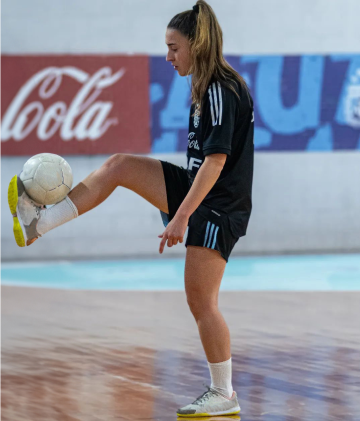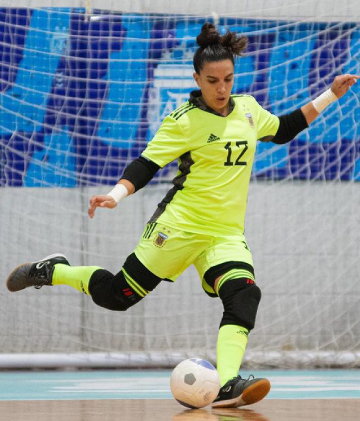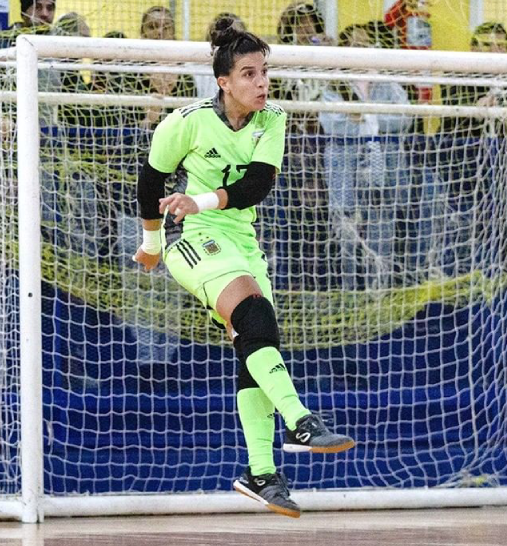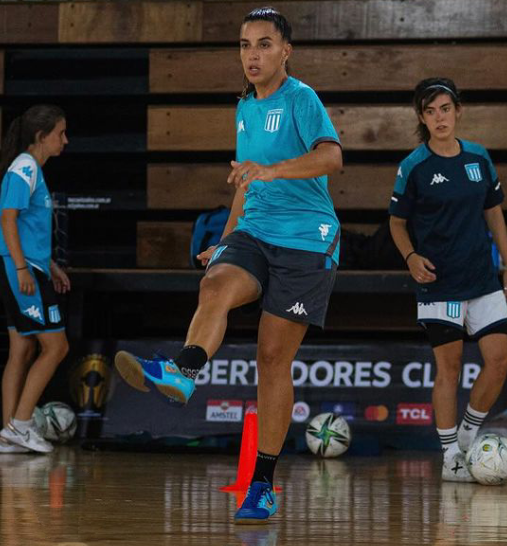Women's Voices: Conversations with Professional Futsal Players
During International Women's month, we explore the world of women's futsal through a conversation with two standout players. Join us as we discuss their experiences, challenges, and aspirations, while recognizing the achievements and struggles of women in sports. Meet Julia Paz Dupuy, representing the Argentina National Team and Poio FS (Spain), and Silvina "Torito" Espinazo , Senda Ambassador, for the Argentina National Team and Racing Club (Argentina).
1
/
of
2
Julia Paz Dupuy (J.P.D) | Argentina National Team | Poio FS (Spain)
Silvina "Torito" Espinazo (T.E) | Argentina National Team | Racing Club (Argentina) | Senda Ambassador
What has been your personal experience in women's futsal so far? What challenges have you faced as a player?
J.P.D: Well, my personal experience in women's futsal, and more specifically the challenges I had to face, I believe the greatest one was having to demand a competition that should have existed on its own, as it is FIFA's obligation to oversee beach soccer, futsal, and women's football. I think that was the biggest challenge, and it's interesting to consider how certain things are given to male players by default, while female players had to go out and seek them. Also, another thing, I remember being 14 years old and tweeting, questioning why this competition doesn't exist, if it's the same sport. So, I think one of the biggest challenges was that, demanding it and at the same time organizing a fight, which obviously was through a players' association that gathered the most prominent figures, which was the unified voice of a demand, otherwise it would have been very difficult. And besides, it was for a long time, it wasn't overnight, obviously since 2014 when the movement started and different campaigns, measures, letters, meetings were carried out, until perhaps reaching the most influential.
T.E: My experience so far has been very positive. One of the main challenges I've faced is promoting and encouraging participation from my position as a player. I believe it's crucial to transmit the passion for the sport and the opportunities for growth within the discipline, so that more women choose futsal as their sporting career.
What impact do you think the Women's Futsal World Cup will have on the growth and development of the sport worldwide?
J.P.D: I believe the greatest impact will be on the future generation. I think one of the major reasons why some players decided to join ONCE was due to economic reasons but also because of competitive opportunities. So, I think having a World Cup will be beneficial first, so that players no longer have to fight for that, which I find crucial. Secondly, the younger ones can dream of playing it, and then have players to look up to, to inspire them, what we obviously call role models. Nowadays, no player has a role model who has played in a World Cup or has been the best in a World Cup because there hasn't been one. So, I believe the impact will be seen in the younger generations.
T.E: It will surely have a significant impact. An event of this magnitude is always important for growth, dissemination, and furthering the awareness of women's futsal worldwide. We hope it will be a turning point for leagues around the world to start expanding.
What message would you send to young women who dream of following in your footsteps in women's futsal?
J.P.D: No, well, it really seems like a lot to say that any player dreams of following in my footsteps, but well, I believe that, more than anything, if I have been able to or can influence in any way, it's in showing that there is a possible professional path to live off of this, to also represent your country's colors, to compete, to travel the world. I've been playing abroad since I was 18 years old, and I had the opportunity to sign a professional contract at a fairly young age, which is really something I never would have imagined. So, I don't know if anyone dreams of being like me, I don't really think so, but you never know who you can inspire. However, I do believe that I can mark or show a possible path, I think that's more along the lines. That seems more realistic to me, to mark a possible path.
T.E: I would encourage them to always try, no matter the cost or the time it takes. It's always worth fighting for what you dream of, and eventually, it pays off.
What changes would you like to see in women's futsal in the coming years to promote equality and empowerment of women in sports?
J.P.D: Regarding the changes I would like to see in women's futsal in the coming years, I believe one of the main reasons for the lack of competitive opportunities, as well as salary inequality and structural issues, is the lack of women in decision-making positions, in hierarchical positions where decisions are made, and where women don't have a voice. I remember looking at how many women there were in FIFA. Why is this? Because we didn't have a specialized women's futsal committee in FIFA. I think that would be a big step forward, a great start as well, a committee specialized solely in women's futsal, not just a branch of eleven-a-side football, but measures specifically designed for women's futsal.
T.E: Improving working conditions and expanding the rights of players in all leagues. Continuing to promote the discipline, attracting investors and sponsors to support the global growth of futsal, with genuine interest in the activity.
At Senda, we're committed to amplifying women's voices and fostering an environment where every player can thrive. As we celebrate the upcoming inaugural Women's Futsal World Cup, let's continue advocating for the growth of women's futsal, offering equal opportunities and recognition. Together, we can build a more inclusive future for all futsal players.
You may also like
-
Ushuaia Club 2.0 Futsal Shoe
4.54 / 5.0
(13) 13 total reviews
Regular price From $59.99Regular priceUnit price / per$59.99Sale price From $59.99 -
Rio Match Futsal Ball
5.0 / 5.0
(1) 1 total reviews
Regular price $34.99Regular priceUnit price / per$34.99Sale price $34.99 -
Gravity Pro Crew Length
4.5 / 5.0
(10) 10 total reviews
Regular price $24.99Regular priceUnit price / per$24.99Sale price $24.99 -
Ushuaia Pro 2.0 Futsal Shoe
4.8 / 5.0
(5) 5 total reviews
Regular price $119.99Regular priceUnit price / per$119.99Sale price $119.99
Other Blog Notes
View all-

Senda Becomes the Third Futsal Footwear Brand at the First FIFA Women’s Futsal World Cup
At the first-ever FIFA Women’s Futsal World Cup, Senda reached a historic milestone—becoming the third futsal footwear brand worn on court and reinforcing its commitment to the growth of the women’s game worldwide.
Senda Becomes the Third Futsal Footwear Brand at the First FIFA Women’s Futsal World Cup
At the first-ever FIFA Women’s Futsal World Cup, Senda reached a historic milestone—becoming the third futsal footwear brand worn on court and reinforcing its commitment to the growth of the women’s game worldwide.
-

Ushuaia Pro 2.0 Futsal Shoes: New Orange & Silver Color Drops Are Here
The Ushuaia Pro 2.0 Futsal Shoe arrives in new Orange and Silver colorways, combining elite indoor performance, advanced traction, and bold modern style—built for the intensity of futsal.
Ushuaia Pro 2.0 Futsal Shoes: New Orange & Silver Color Drops Are Here
The Ushuaia Pro 2.0 Futsal Shoe arrives in new Orange and Silver colorways, combining elite indoor performance, advanced traction, and bold modern style—built for the intensity of futsal.
-

Celebrating Fair Trade Month with Senda
This October, Senda celebrates Fair Trade Month by honoring the people behind every ball. Discover how Fair Trade creates impact on and off the field.
Celebrating Fair Trade Month with Senda
This October, Senda celebrates Fair Trade Month by honoring the people behind every ball. Discover how Fair Trade creates impact on and off the field.
1
/
of
3
















